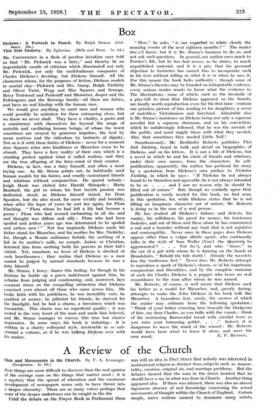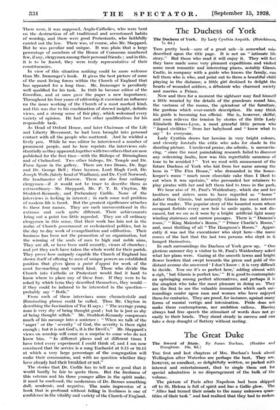A Review of the Church
Men and Movements in the Church. By F. A. Ircmonger.
(Longmana. 4s. 6c1.)
FEW things are more difficult to discover than the real opinion of the' average man on the things that matter most : it is a mystery that the spread of education and the enormous development of newspapers seems only to have thrust into a deeper obscurity. There are so many voices perhaps that none of the deeper undertones can be"caught in the din Until the debate on the Prayer Book in Parliament there was still an idea in Fleet Street that nobody was interested in institutional religion as distinct from subjects such as humor- tality, creation, original sin, and marriage problems. But the debates showed that the man in the street insisted that he should have a say in what was done in Church. Another thing appeared also. If there was interest, there was also an almost ingenuous absence of real knowledge concerning the actual movements of thought within the Church of England. Certain simple, naive notions seemed to dominate many minds.
There were, it was supposed, Anglo-Catholics, who were bent on the destruction of all traditional and accustomed habits of worship, and there were good Protestants, who faithfully
carried out the law. There was, of course, also Mr. Sheppard. But he was peculiar and unique. It was, plain that a large
percentage of members of the House of Commons numbered few, if any, clergymen among their personal friends ; and in this, it is to be feared, they were truly representative of their constituencies.
In view of this situation nothing could be more welcome than Mr. Iremonger's book. It gives the best picture of some of the most living forces within the Church of England that
has appeared for a long time. Mr. Iremonger is peculiarly well qualified for his task. In 1923 he became editor of the
Guardian, and at once gave the paper a new importance.
Throughout his four years of editorship it exercised an influence on the inner working of the Church of a most marked kind, and this was due to his combination of shrewd insight, definite views, and a strong sense of fair play, which welcomed every variety of opinion. He had two other qualifications for his responsible task.
As Head of Oxford House, and later Chairman of the Life and Liberty Movement, he had been brought into personal contact with all the people who mattered. And he wielded a lively pen. While he was editor he interviewed a number of prominent people, and he here reprints the interviews sub- stantially as they appeared,together with two others that are now published for the first time—with the Bishops of Birmingham and of Chelmsford. Two other bishops, Dr. Temple and Dr.
Furse figure in the gallery. There are two Deans, Dr. Inge and Dr. George Bell ; three laymen, Lord Hugh Cecil, Dr. Joseph Wells (lately head of Wadham), and Dr. Cyril Norwood, the headmaster of Harrow. There are also four ordinary clergymen—if it would not be truer to describe them as extraordinary—Mr. Sheppard, Mr. P. T. B. Clayton, Mr Studdert-Kennedy, and Prebendary Carlile. None of the interviews is lacking in interest ; in each some real problem of modern life is faced. But the greateit significance attaches to these four names. They are each unconventional in the extreme and each quite different. Their achievements bring out a point too little regarded. They are all ordinary clergymen in this sense, that their work has lain not in the realm of Church government or ecclesiastical politics, but in the day to day work of evangelization and edification. Their business has been not the promotion of an organization, but the winning of the souls of men to high and noble aims. They are all, or have been until recently, vicars of churches ; and yet they each have taken the whole world for their parish.
They prove how uniquely capable the Church of England has shown itself of offering to men of unique powers an established position that gives them a point d'appui for work of the most far-reaching and varied kind. Those who divide the Church into Catholic or Protestant would find it hard to know where to place any of these four. If they were to be asked by which term they described themselves, they would— if they could be induced to be interested in the question— probably say " Both."
From each of these interviews some characteristic and illuminating phrase could be culled. Thus Mr. Clayton in describing the fascination of Toe II says : " The average young
man is very shy of being thought good S but he is just as shy of being thought selfish." Mr. Studdert-Kennedy compresses
much of his message into a sentence : " When we talk of the anger' or the ' severity' of God, the severity is there right enough ; but it is not God's, it is the Devil's." Mr. Sheppard's
views on worship will come as a surprise to some who do not know him. " In different places and at different times I have tried every experiment I could think of, and I am now convinced that the service is a sung Eucharist -at 9.15 or 10.15 at which a very large percentage of the congregation will make their communion, and with no question whether they have already had their breakfast or not."
The stories that Dr. Cathie has to tell are so good that it would hardly be fair to quote them. But the freshness of this veteran and his three younger allies in the spirit make,
it must be confessed, the modernism of Dr. Barnes something dull, academic, and negative. The main impression of a book that is profound without failing in liveliness is one of confidence in the vitality and variety of the Church of England. •







































 Previous page
Previous page